Basketball has always been a part of Kellie Harper’s life. “When my parents brought me home from the hospital, they put a basketball in my hands and took a picture,” Harper says. It’s no wonder that she tells people she has played her whole life. The Sparta, Tennessee native grew up with her parents, both of whom played college basketball at Tennessee Tech University, and two younger brothers; one followed in their parents’ footsteps and played college ball at TTU and the other was a manager for the UT Chattanooga women’s basketball team. “It was a strong basketball family, but a strong family period.”
Harper refined her skills throughout her schooling at White County Middle and High Schools, while participating in several local and statewide AAU programs. Because these didn’t include showcases like today’s current programs, Harper relied on herself to maintain and improve her skillset. Her hard work ethic on and off the court began at a young age and translated into her college career at the University of Tennessee. She went on to play for Pat Summitt as a point guard during the Lady Vols’ reign as three-time national champions from 1996-1998. Fast forward to the spring of 2019 and Harper was welcomed home to Rocky Top with 15 years of coaching experience under belt. Former Lady Vol Cait McMahan caught up with Coach Harper to talk about her basketball career and what fans can expect for the upcoming season.
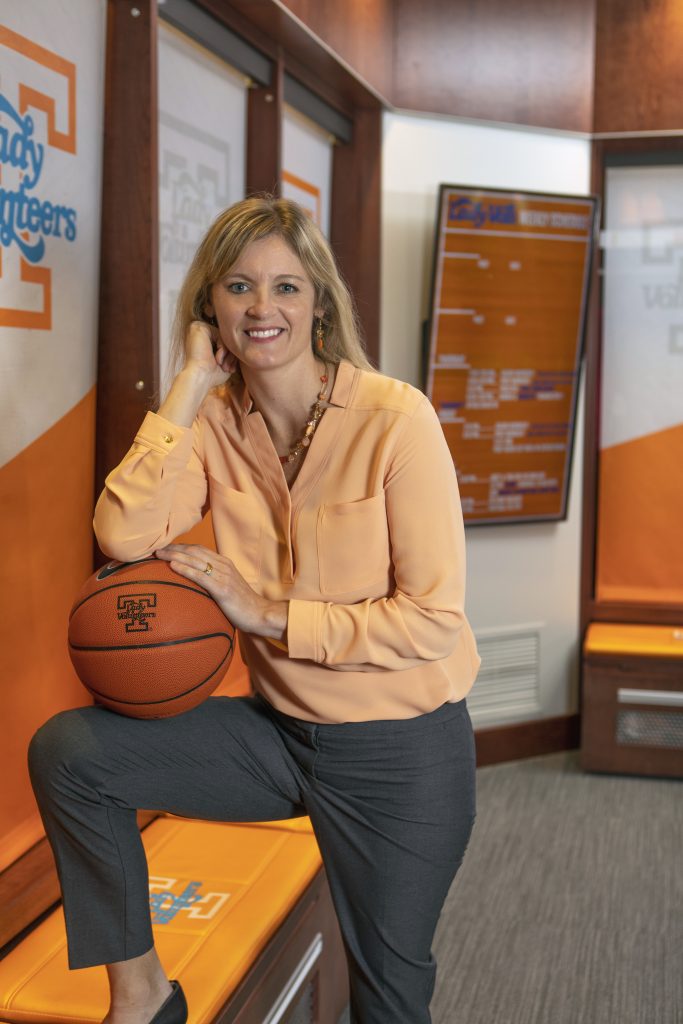
Cait McMahan: When did you start getting recruited?
Kellie Harper: It was happening early. My freshman year I remember some coaches starting to recruit our school. I remember them coming to practices, coming to watch our games, but I also do not remember focusing on that. I didn’t know who was there and I didn’t know when they were there, with one exception. I remembered when Pat was at one of my games.
CM: Do you remember what year you were?
KH: I was a senior. She came and watched me when I was younger, but I remember this time because I knew she was coming.
CM: I can relate to this growing up. When she’s there, she stands out. You can’t miss Pat Summitt. Can you tell me some of the emotions you were experiencing during the game?
KH: I had torn my ACL my senior year and this was one of the games back and she was going to come watch me play. I only played six games that year. I was already committed and signed, so it was a little bit unique. I had enough on my plate trying to figure out how to play when I’d only played in a couple of games thus far. It was the best of my six that I played. After the game, I remember so many people didn’t want to talk about the game. They didn’t want to talk about how I played. They wanted to talk about Pat Summitt being in the stands. I know you can probably relate to that as well.
CM: I feel like you’re my spirit animal. I tore my ACL my senior year and only played six games. Had you committed to Tennessee or just signed a letter of intent?
KH: I had committed my junior year. I wanted to commit before phone calls. That seemed like a headache I didn’t want to have. I didn’t have the time and I didn’t want to start telling people no. Fortunately, she had offered me early enough that I could commit and get that out of the way. That was a huge weight off my shoulders.
CM: Then, she came to your house. Tell us about that visit.
KH: If Pat Summitt’s coming to White County, we’ve got to clean the house. Everybody cooked. We had more food there than Thanksgiving. Aunts and uncles were bringing by dishes because they wanted to make sure we had enough. I would think four casseroles would have been plenty. We got out the good china. It was a big deal.
CM: Were you nervous?
KH: I was a little nervous because I’m not immune to the awe; you grow up in the state and there’s a little bit of awe of this woman when she’s walking in your door. I think because I’m already coming to Tennessee, there was not a selling point. She shared their vision. It was a reiteration of the expectations of the Lady Vols program and what they want to see from me.
CM: What made you want to go to Tennessee?
KH: Growing up in Tennessee, I actually wasn’t the kid that wanted to go to UT. I didn’t grow up with that passion and with that love. I had a teammate who wanted more than anything to come to UT and she was denied that opportunity. When I saw her going through that process, I realized that maybe I didn’t need to put my heart and soul into something that I wasn’t sure would happen. I stayed neutral for a very long time, until I came to visit and I stepped foot in Pat’s office. I walked out of there and knew at that moment where I was going to school. She had not offered me a scholarship yet, but I knew at that moment this is what I wanted to do. It was just a surreal moment. I held onto that.
KH: I knew in my heart it was the right place. I felt a connection with her and with the program.
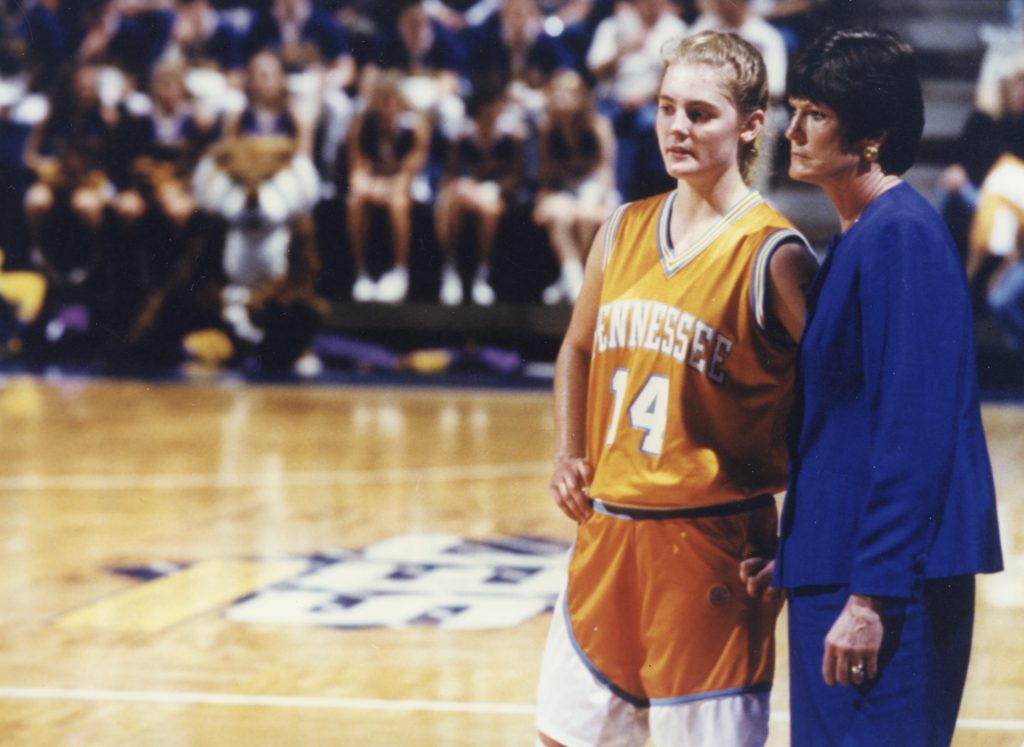
CM: Would you say it’s her passion or her respect? She’s hard, but she cares.
KH: I think it was just really powerful. You walk in and her presence fills a room and is just graceful, classy. When she speaks to you, you feel that care that she actually has; you see the stare, you see the intensity, but you also feel the genuine love. And that’s what I felt.
CM: Walk us through one memory from your freshman year in college.
KH: I was a shooting guard my freshman year most of the time. Towards the end of the season they started playing me more at the point. One of the strongest memories I had, we were at the Elite Eight playing Virginia. I was playing point guard, bringing the ball up the court, and I get my pocket picked. They steal and go score a layup. This is late in a pretty tight game.
KH: One of our seniors fortunately came running down and grabbed the ball to bring it back up the court. Obviously, there’s someone at the table to get me out of the game. We won, and after the game I remember my dad apologizing to Pat for my turnover. In that moment it was just so heavy on me as a young athlete that I made this big, big mistake and I remember Pat saying, it’s going to help you be a better player later.
CM: That’s facts.
KH: It is true. Now as a coach, absolutely that moment made me grow as a player and helped me be better.
CM: After winning the championship your freshman year, you tore your ACL again and sat out half of your sophomore season?
KH: We had two point guards that year. Right before the season started, Pat calls Laurie Milligan and I together and says we’re going to be point guard by committee. Laurie’s going to play part time and I’m going to play part time. Well, I get injured. So, Laurie is the point guard for the first part of the season. I get back, we played four games together, and the fourth game she hurt her knee and didn’t get to play anymore. And I finished the season.
CM: It’s crazy how that worked out. And then, you went on to win the championship your sophomore year. Let’s fast forward to junior year.
KH: Our junior year was the best team I played on. We were just really good and we had an air about us. I always tell people, I don’t think we were cocky, but we were borderline. It was just a vibe with that team. We had three All-Americans on that team. We had four freshmen with a lot of energy that made a huge contribution. Chamique Holdsclaw and myself were both juniors who were a little calmer. I thought the balance was perfect. Everyone bought into their role as we went 39-0. It was pretty magical.
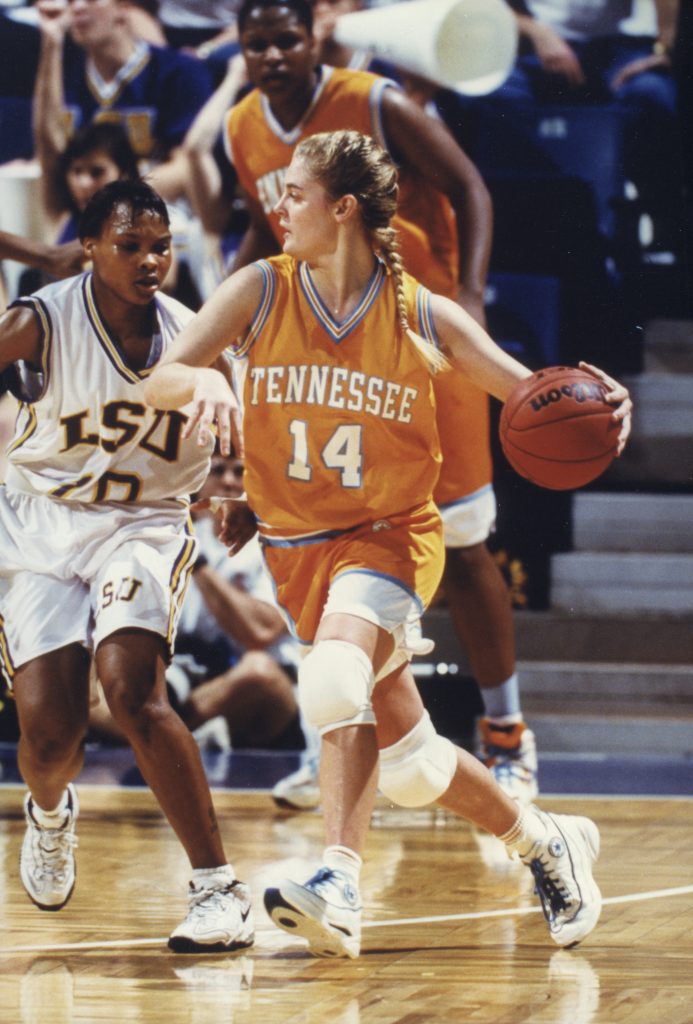
CM: Awesome. Senior year: let’s finish with that.
KH: It’s taken me a lot of years to be able to step back, evaluate, and assess what happened. We were heavy favorites to win another championship. Going into my senior season, I think we did not enjoy the process that you have to have throughout a season. You have to find ways to get better. We wanted to go win a national championship. We wanted the dessert before the meal. The substance wasn’t there with that team. We lost in the Elite Eight, which I’m a little bitter about still, but I can talk about it now. It has helped me as a coach to have a little bit of perspective on the importance of the season. Because we are a tournament sport, you can look ahead too much and not enjoy the daily rigors. Every day you’ve got to find ways to get better. I really do believe we wanted to fast forward and get to the good stuff, and it just doesn’t work that way. Had we won in the Elite Eight, I really feel like we would have won another national championship.
CM: So after losing Elite Eight, you’re graduating college. In your mind, what’s next?
KH: For me, I wanted to play professionally. I graduated on a Friday. I got married on Saturday and reported to the WNBA on Sunday. It was a lot. I went to the WNBA and played four minutes. I didn’t make the teams. It wasn’t meant to be. It hurt because I’ve literally played basketball my entire life, so now I’m not going to have that. It was difficult.
CM: It’s like, ‘What do I do now?’
KH: I knew I wanted to coach. Joe Ciampi down in Auburn had given me an opportunity to be an administrative assistant for him. It got my foot in the door and I got to see a Hall of Fame coach in person. He has a great mind and was very adamant about sitting me down and making sure that I knew not everywhere was like Tennessee. I’m very thankful and grateful for that because I thought every place was like Tennessee and it’s not. We were something very special, very unique. I remember going to our first game at an SEC school and me saying, ‘Where is everybody? Where are the fans?’ When Tennessee was there, everybody came to watch.
CM: During your coaching career, did you often call Coach Summitt to get advice or pointers?
KH: I called her a couple times and then I spoke to her in person. We were at recruiting and I would grab her and say, ‘Hey, what about this situation that I have, how would you handle this?’ She gave me some advice on basketball stuff, how to run a program, personnel stuff, so throughout my career I was able to lean on her
CM: In doing this interview, I wanted to stray away from comparing you to Pat because I’m a firm believer in you. You’re going to do it your way and as you should. Is there anything though you are going to bring with you that Coach Summitt taught you as a player?
KH: It’s a great question and I understand there’s going to be comparisons because we’re in the same position. I’m not trying to be her and I’m okay with that. There were two things that I always felt like I was able to take from her and implement. The first thing was her class. Her program was very classy. It looked right always. She treated people the right way. I wanted my programs to always have that.
KH: The other was, and you may be able to attest this, but her poise in a huddle was amazing. She was so comforting when she would get in a huddle. Now, she could rip you. But when the game was on the line, she could come back to the bench and very calmly say what we’re going to do. She projected that confidence, that poise onto our team. I always thought that was really important for me to do for our teams. They never need to see a panicked coach. They always need to see a competent coach so that they take that onto the court.
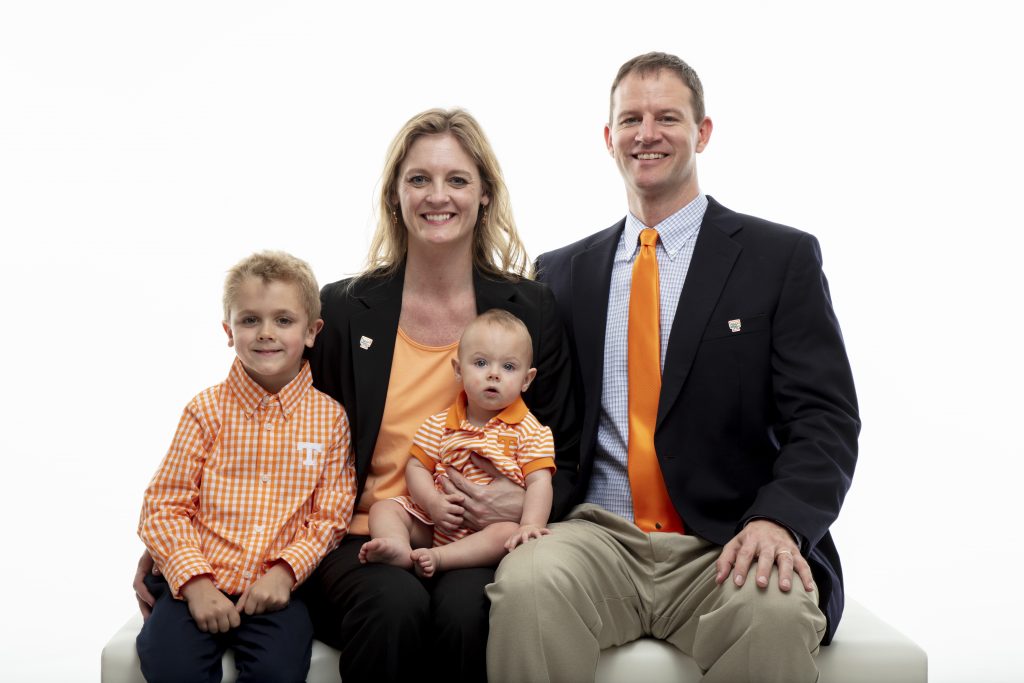
CM: Off the court, tell us about your life. It’s a whole other team isn’t it?
KH: It is! I have taken four head coaching jobs, so I’ve done this transition before. I get the pace, the feeling of urgency when you’re trying to catch up and make up ground, but this is the first time we’ve done it with children. I think that dynamic has been a little bit more challenging in terms of logistics. I love my life. I love our family. It is an amazing way for kids to grow up. But, it’s been a lot on them as well.
CM: I bet. Just the transition and everything. If you do not know, her husband is also one of the coaches. At home, is there ever any talk about what goes on at practice?
KH: A little bit, but we’re a little bit more mature now than we used to be. We understand how to approach those subjects more. Now people do ask if we take it home. It’s our life. There’s no, you walking out of the office and you’re in your own personal time. That’s not the way this works. This is your life. I’m a mother 24/7. I am also a basketball coach 24/7. I just am. We both feel really good about that, but when we go home a lot of our time now is spent with our children. We don’t like to talk a lot about the team or practice in front of our kids.
CM: I think that’s beautiful. It’s super cool.
KH: I think the great thing there is the trust. There is a loyalty that no matter what he’ll be there for me, and we’re in this together. He’s there in the trenches with me.
CM: You’re the only coach that I know of that’s in that situation. I’ve heard he’s a genius with the Xs and Os. What’s his role on the team?
KH: I think his strength is understanding situations in terms of time and score. That just comes natural to him. During a game in those situations, he’ll come up and say, ‘You’ve got one timeout, think about using it now,’ or ‘we’re going to need a timeout with a minute to go.’ He’s pretty sharp with those types of things and I think that’s been really beneficial for me. His approach to the Xs and Os is different than mine and that is perfect. His is doing the exact same drill every single day to be really good at this. I’m ready to move on to something else and he will stick with it. I think it’s a good balance.
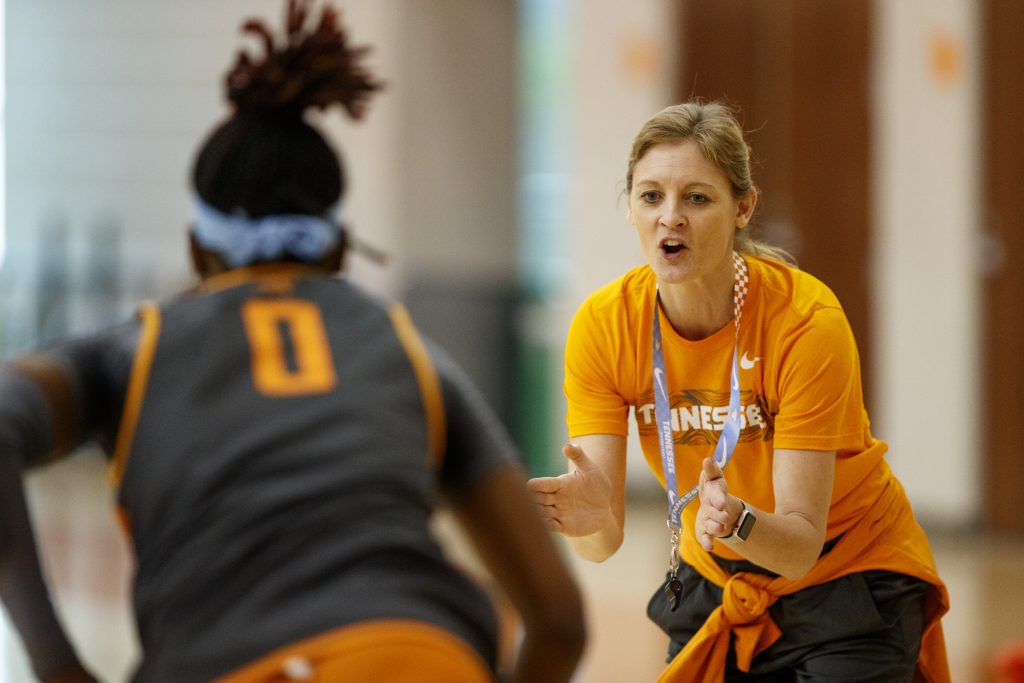
CM: Is there anything you are going to change about the current Tennessee program?
KH: We watched games and maybe we had perceptions, but we’re not going to judge them on anything in the past. We’re just judging them on what we know now. One thing that we’ve told them is we are going to work hard. We’re going to be tough. We’re going to enjoy it. We’re going to have fun while we’re doing it. We’re going to be great teammates. You’re going to be a team that our fans love to watch, and hopefully the opponents hate to play. Those things are hard to build and take time. We understand that every single day we have to reiterate all these details. Every single day we have to talk to them about what it looks like to go hard, what it looks like to be a great teammate, what toughness is about, and how we are going to handle adversity. We are having these conversations with our team daily right now because we’re trying to build a strong foundation.
CM: Before my last question, I’m a huge fan. I think you’re going to do great. One of the things you have that no one else has is that you were an excellent point guard and player. Not only did you see the court from the court, but off the court because of your injuries. Last question: what can you tell the fans out there to expect for this season?
KH: Our team will play hard, our team will play more, and we are going to work on our execution. We will be motivated, because that’s non-negotiable. The players have been given so much and this is such a great opportunity for them, but they have to go out and show that this is a big deal to them. They may be learning what that looks like consistently, but they’ll do that. I’ve been proud of them. I think they want to do it. We just have to make sure they know how that needs to look.
CM: I’m getting fired up, I’m about to flip these couches. All right. This is Cait McMahan with Cityview Magazine. We are wrapping up the interview with a new coach, new team, new organization.
